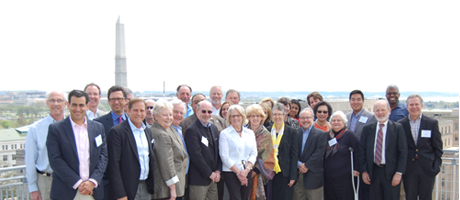Columbian College’s National Council for Arts and Sciences celebrated its 20th anniversary last month at a dinner held at the United States Institute of Peace. Comprised of alumni, parents, and friends of the college, the council was applauded by President Steven Knapp and Provost Steven Lerman for its commitment and service as a volunteer advisory board to the dean of the college. Pam Lawrence, BA ’76, chair of the National Council and senior vice president of North Shore Medical Center in Massachusetts, recently offered her thoughts on service, philanthropy, and the need to remain engaged in the life of the university.
Tell us about the National Council’s impact over the last 20 years.
In the early days, the National Council was a way for interested alumni to stay connected or to reconnect with GW and to hear from the dean and the faculty about activities on campus. In the ensuing years, the dean began soliciting advice from the council on a range of local initiatives and issues affecting higher education in general.
As the group coalesced, the ways that National Council members have engaged with the university have become as diverse as the interests of its members. For example, one member works with the NYC Real Estate and Finance Alliance to mentor GW students and help them network. Another is the honorary producer of multiple student theatre programs. Many serve as GW ambassadors, hosting events to connect alumni and donors, and others have been instrumental in securing major philanthropic support for university programs, such as the Solar Institute. The thread that ties us all together is a passion for GW and a desire to support the university, its faculty, and its students.
What drives your personal philanthropy and service to Columbian College and the university?
GW was a transformational experience for me personally and professionally. That makes me very loyal, but it also makes me feel responsible for supporting the college and the university so it can provide the same experience for others.
Where have you chosen to direct your philanthropic support and why?
For me, the focus on citizenship, volunteerism, and public service is incredibly significant as it supports values that students carry forward for life. Service learning courses provide a strong academic foundation and also strengthen the ties between the university and the city that is its home. That is why I chose to support the Center for Civic Engagement and Public Service and the Columbian College faculty who teach those courses.
Why do you think it is so important for alumni to give back and remain active members of the university community?
The university is truly a community and being a part of a community is an essential component of our society. The GW community is incredibly diverse, increasingly robust, and a tremendous resource for new ideas and lifelong learning. The key is to simultaneously take advantage of it and to support and enhance it.
Was there a favorite class, professor, or mentor that helped direct your professional path or made an impact on your life choices?
There were actually two. The first was Professor Rod French who was in charge of a program called Experiential Humanities, which was the predecessor of today’s service learning initiatives. He taught us the importance of engagement with our new urban community and instilled a passion for public service. The second was Professor Morgan who taught Constitutional Law in the Political Science Department, and I credit him with teaching me to think critically and systemically. As a strategic planner, these are skills I use every day. My heartfelt thanks to them both!
As a person with a successful, versatile career, what advice would you give students and young graduates who want to achieve similar success?
Study what you are passionate about, but stay open to career opportunities that are relevant and yet different. You graduate with a base of knowledge but more importantly with a set of skills that can be applied in many ways and in many settings. And, always remember that you build your professional credibility and reputation with each and every daily interaction.


